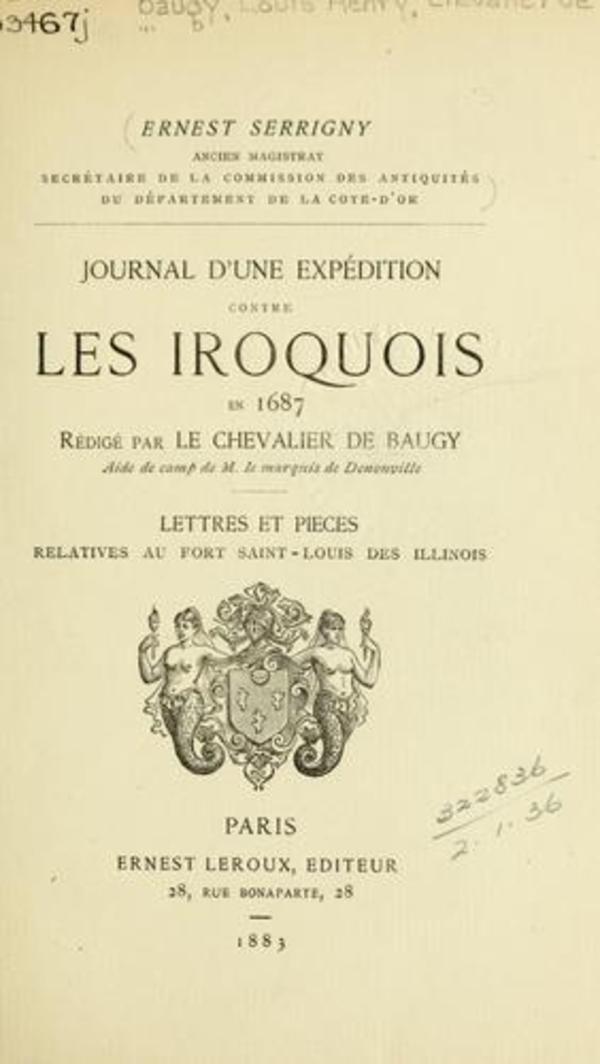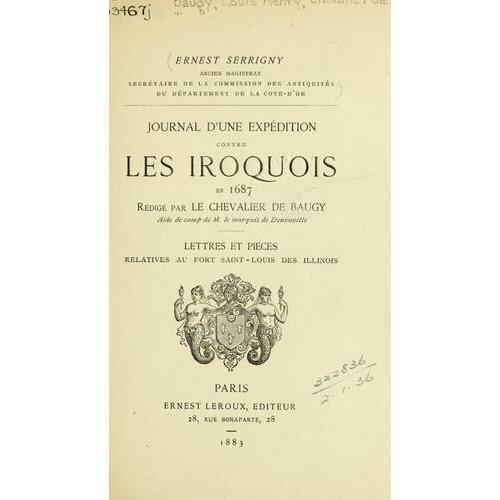
Source: Link
BAUGY, LOUIS-HENRI DE, known as Chevalier de Baugy; b. on a date unknown; d. 1720 in Paris. He came from a noble family of the province of Berry; his father, Guillaume de Baugy, was a king’s counsellor and captain of light horse in the regiments of Cardinal Mazarin.
Baugy sailed for Canada from La Rochelle on the night of 12–13 July 1682 on the Saint-François-Xavier. He arrived at Quebec in October together with Le Febvre* de La Barre, who was succeeding Buade* de Frontenac. The new governor, under pressure from the group of merchants who envied the advantages enjoyed by Cavelier* de La Salle in the Great Lakes region, undertook to deprive the latter of his possessions. He entrusted this mission to Morel de La Durantaye, a former captain in the Régiment de Chambellay, to whom he assigned the Chevalier de Baugy as lieutenant. By their commission dated 1 and 15 March 1683 and the instructions which followed on 20 April, they were both under orders to seize the canoes of the coureurs de bois who did not have a fur-trading licence; to urge the Illinois, Tionontatis, and Miamis to take their pelts to Montreal; to keep watch over La Salle, and to seize his possessions if the accusations levelled against him proved to be correct.
On 23 April 1683 the two agents left Quebec for Michilimackinac, where they arrived on 2 July. While La Durantaye was setting himself up at Michilimackinac, Baugy proceeded towards Fort Saint-Louis des Illinois. On the way, when he was 15 leagues from the fort, he met La Salle, who was returning to Montreal from the Mississippi. Baugy informed him of his mission, and La Salle deferred to him. La Salle wrote a letter to his partner Henri Tonty, the commandant of Fort Saint-Louis, asking him to receive Baugy courteously. Tonty obeyed; he handed over command of the fort to La Barre’s envoy, but he remained on the spot in order to attend to La Salle’s interests.
Between Tonty and Baugy, who was looking after the interests of La Barre, there was frequent friction. Baugy tried in vain to entice away Tonty’s men who, in return for an increase in wages and promises of grants of land, remained loyal to La Salle. On 21 March 1684 the two rivals had to forget their quarrels to organize the defence of the fort, which was threatened by 200 Iroquois. The siege lasted six days. Baugy dispatched a courier to Michilimackinac. Thanks to the support of a party of Illinois, however, they succeeded in repelling the Iroquois well before the arrival of La Durantaye and his men. When La Durantaye reached the fort on 21 May he brought with him precise orders from La Barre: Tonty was to leave the fort and Baugy to take over sole command there.
While Baugy was enjoying a monopoly of the fur trade among the Illinois, La Salle was successfully pleading his case at Versailles. Reinstated in his privileges by the king, La Salle dispatched Tonty to Fort Saint-Louis as governor of the fort. Tonty presented himself at Fort Saint-Louis on 26 June 1685. The tables were turned: Baugy was obliged in his turn to leave the fort and go back to Quebec.
We find no trace of Baugy in any records until the spring of 1687, when he took part as Brisay de Denonville’s aide-de-camp in the campaign against the Senecas. The valuable account which he left of this action demonstrates a great concern for exactness and precision. Denonville highly appreciated his aide-de-camp’s services during this campaign, and thought fit to recognize his merit by granting him the honour of a company in Canada.
Baugy did not die in 1689, as Margry states, but went to France in November of that year. He never returned to Canada. As seigneur of Villecien, Villevallier, Fay, and other places, he lived in his château at Villecien. On 19 Feb. 1696 he was appointed captain-major at Saint-Julien-du-Sault. He died in Paris on 19 Feb. 1720 and was buried in the chapel of his château at Fay.
Baugy, Journal (Serrigny). Découvertes et établissements des Français (Margry), V, 4–7. Ord. comm. (P.-G. Roy), II, 3–33, 43. Eccles, Frontenac. E. R. Murphy, Henry de Tonty, fur trader of the Mississippi (Baltimore, 1941). Benjamin Sulte, “Les Tonty,” RSCT, lst ser., XI (1893), sect.i, 3–31.
Cite This Article
Jean Hamelin, “BAUGY, LOUIS-HENRI DE, dit Chevalier de Baugy,” in Dictionary of Canadian Biography, vol. 2, University of Toronto/Université Laval, 2003–, accessed December 13, 2025, https://www.biographi.ca/en/bio/baugy_louis_henri_de_2E.html.
The citation above shows the format for footnotes and endnotes according to the Chicago manual of style (16th edition). Information to be used in other citation formats:
| Permalink: | https://www.biographi.ca/en/bio/baugy_louis_henri_de_2E.html |
| Author of Article: | Jean Hamelin |
| Title of Article: | BAUGY, LOUIS-HENRI DE, dit Chevalier de Baugy |
| Publication Name: | Dictionary of Canadian Biography, vol. 2 |
| Publisher: | University of Toronto/Université Laval |
| Year of publication: | 1969 |
| Year of revision: | 1982 |
| Access Date: | December 13, 2025 |



